|
|
|
Sort Order |
|
|
|
Items / Page
|
|
|
|
|
|
|
| Srl | Item |
| 1 |
ID:
168565
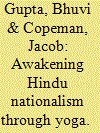

|
|
|
|
|
| Summary/Abstract |
Alongside Prime Minister Narendra Modi, whose politics he explicitly endorses, Swami Ramdev is frequently depicted as the contemporary face of neo-Hindutva nationalism in India. This essay concerns specific, but interrelated, aspects of the Swami Ramdev ‘phenomenon’ and their particular relation to Hindu nationalism. We bracket the headline-stealing anti-Islamic and pro-Modi proclamations in order to focus on the nuances of the relationship between his yoga and a majoritarian Hindutva agenda and examine the specifics of Ramdev’s teachings and campaigns. We suggest that the (Hindu) nationalism of Ramdev and his organisations is formed less of propositional or even affective content but instead is a condition emerging from its particular prescription and practice of yoga; it is a condition of the body. In this way, yoga, as it is reproduced at the site of the individual body, produces the national(ist) activist subject.
|
|
|
|
|
|
|
|
|
|
|
|
|
|
|
|
| 2 |
ID:
168567
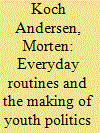

|
|
|
|
|
| Summary/Abstract |
This article illustrates some of the practices that turn young student men into political activists. It shows how everyday routine practices bring order and meaning to a social field of hierarchical competition and conflict amongst young men at Dhaka University. The focus is on those practices that make and shape the organisations everyday, involving and bringing people together in a collective of activism and exclude others. Routines continuously reconstruct relations of hierarchy, organisational order and operation, which on one hand, transform individuals from students into activists, on the other hand, it produces structured hierarchies and operational logics. It makes activism and shapes organisations. The article concludes that a focus on the internal dynamics of mobilising organisations, mundane intimate interactions and the display of public practices, can pay dividends when it comes to a deeper understanding of the formation of political activism.
|
|
|
|
|
|
|
|
|
|
|
|
|
|
|
|
| 3 |
ID:
168571
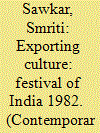

|
|
|
|
|
| Summary/Abstract |
This article employs the concept of culture as a consumable resource in visually-mediated global markets. The Festival of India, first hosted in 1982 in Britain, was a unique state-sponsored spectacle that packaged Indian culture as a commodity for Western audiences. Indira Gandhi as Prime Minister took keen interest in the ‘visual scheme’ of India that was projected during the Festival, simultaneously conscious of her own image as she returned to power after the contentious rule of the ‘Emergency’. The article suggests that Gandhi sought to divert negative media attention on her regime by putting on display India’s ‘soft power’ in artistic and scientific fields. It further comments upon the diversity in the reception of the event by various audiences thereby challenging the notion of passivity often attributed to consumers of cultural performance. By examining how Gandhi and her advisors used culture as something ‘exportable’ to remake her image, the article seeks to place the Festival alongside similar spectacles staged in the early 1980s when Gandhi’s leadership faced a crisis of legitimacy, both at home and abroad.
|
|
|
|
|
|
|
|
|
|
|
|
|
|
|
|
| 4 |
ID:
168566


|
|
|
|
|
| Summary/Abstract |
This paper explores questions of mobility, ethnicity and spatial imaginaries in Sri Lanka through the experiences of fishermen in Mutuwall, a neighborhood of Colombo. While scholars of Sri Lanka have explored the historically contingent nature of Sri Lanka’s island-identity, this paper engages with the contemporary construction of island-ness through ethnographic fieldwork with twenty-first century residents of the city. Through fishers’ accounts of their pre-war itinerant lifestyles and their experiences living in the coastal High Security Zone during the civil conflict, this essay juxtaposes the free movement of fishers before the war with the heavily restricted movement they experienced at the height of the tensions between the Sri Lankan state and the Liberation Tigers of Tamil Eelam. Fisher itineraries can be understood as dovetailing with state imaginaries of island-wide sovereignty even as they challenge it by describing subaltern movement through space. Ultimately, this paper suggests the importance of contemporary modes of ‘doing’ Indian Ocean studies.
|
|
|
|
|
|
|
|
|
|
|
|
|
|
|
|
| 5 |
ID:
168572
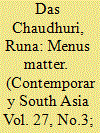

|
|
|
|
|
| Summary/Abstract |
Bengali food, especially in the domestic context, has received much attention in recent academic scholarship, but there is a relative scarcity of studies on cultures of public dining practices in restaurants. This paper attempts to address this gap by exploring how a burgeoning ethnic restaurant industry serving Bengali food in Kolkata conditions class-inhered food practices. Based on in-depth interviews of 46 respondents who assessed the content of restaurant menu cards, this paper examines the branding of a local cuisine and the moulding of a neo-ethnic ‘global’ identity by steeping tradition and authenticity in an aura of the global. The acts of eating out in Bengali restaurants manifest an attitude of ‘gastro-cosmopolitanism’, practiced mostly by Bengalis who live or are perceived to live in the scope of a transnation. The paper observes that while the global latitude in the culinary order has paved the way for blending of cultures, as evident in fusion cuisine, it has simultaneously reproduced a revalorisation of an ethnic cuisine as heritage, exotic and exclusive. Further, class inflections have opened up more options to select from diverse multicultural food items revealing gustatory antinomies among consumers, who are eager to stake a global cosmopolitan identity while attempting collaterally to align with a past that is only alive in their imagination.
|
|
|
|
|
|
|
|
|
|
|
|
|
|
|
|
| 6 |
ID:
168569
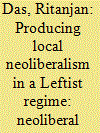

|
|
|
|
|
| Summary/Abstract |
This paper presents a theoretical reassessment of a contentious chapter in India’s economic liberalisation – the case of West Bengal, a state ruled by the pro-labour ‘Left Front’ coalition, led by the Communist Party of India-Marxist (CPIM) from 1997 to 2011. The onset of neoliberalism in India had naturally created a serious political dilemma for the CPIM, but it eventually transitioned to a private-industrialisation agenda, thus prompting serious questions of ideological deviation. While the political-economy of the CPIM/Left Front and its industrial fortunes have been extensively scrutinised, this study introduces a rather different theoretical perspective to the story. Going back to the initial period of policy transition (c.1994), it uses the analytical categories of local neoliberalisms and populist transition to show how the state of affairs in West Bengal under the CPIM was demonstrative of a particular variant of interventionist neoliberal governmentality, characterised by a gradual intensification of pro-market impulses. Furthermore, the study also contextualises West Bengal within wider political economic trends, arguing that pro-market transitions by populist regimes tend to be characterised by a series of mobile calculative techniques of governing, embedded in local historical and geographical specificities and localised relationships.
|
|
|
|
|
|
|
|
|
|
|
|
|
|
|
|
| 7 |
ID:
168568


|
|
|
|
|
| Summary/Abstract |
India's Smart Cities Mission (SCM) launched in 2015 has awarded 100 smart cities nation-wide, proffering funds, compulsory corporate partnerships, and new configurations of urban governance. Perhaps most striking are the ten smart city bids from Northeast India, a region shaped unevenly by separatism, military occupation, and heavy economic dependency. Smart cities in the Northeast have been awarded with key exceptions to SCM rules. We take this to be a largely unprecedented experiment in digital urbanism in what Dunn and Cons (2014. “Aleatory Sovereignty and the Rule of Sensitive Spaces.” Antipode 46 (1): 92–109) label ‘sensitive space’. Through a critical reading of the 10 smart city bids from the Northeast we make three arguments. First, despite the techno-utopian rhetoric, the primary aim of the SCM is integrating frontier space into national territory. Second, the extension of the SCM to the frontier accelerates the recalibration of the frontier into a market for corporate capital under the necessary stewardship of the Indian state, though the role for customary authorities in these arrangements is unclear. Third, with few other avenues for revenue generation and in response to perceptions of neglect, local authorities have used SCM bids to request conventional infrastructure rather than digitally networked projects.
|
|
|
|
|
|
|
|
|
|
|
|
|
|
|
|
| 8 |
ID:
168570
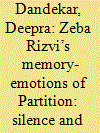

|
|
|
|
|
| Summary/Abstract |
This article analyses the Partition narrative of an Ashraf Muslim woman, who was seven years old at the time of Partition. Now resident in California, Zeba Rizvi was interviewed as part of the 1947 Partition Archive project, archived at the Stanford University Library. In this article, I interrogate relationships between memories and emotions of Partition, reconstituted through oral history that suggests the additional reframing of Partition-memory archives as an emotions archive. While Zeba’s interview reveals how emotional gaps are arbitrated by rapport, or absence thereof, I argue, using a phenomenological approach, that Partition memory-emotions conform to the narrator’s evolving and dynamic sense of self through time, that is also evident in the interview. Zeba Rizvi resists and reconstructs the politics of Partition in agential ways, using art to express secularism and its emotions: love-pyar, while re-inscribing and conforming to Ashraf values of gender, class and the celebration of heritage.
|
|
|
|
|
|
|
|
|
|
|
|
|
|
|
|
|
|
|
|
|